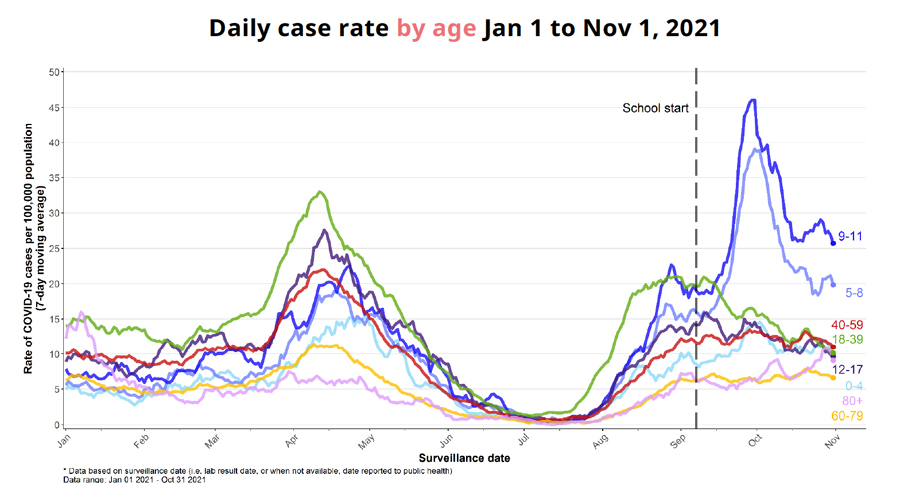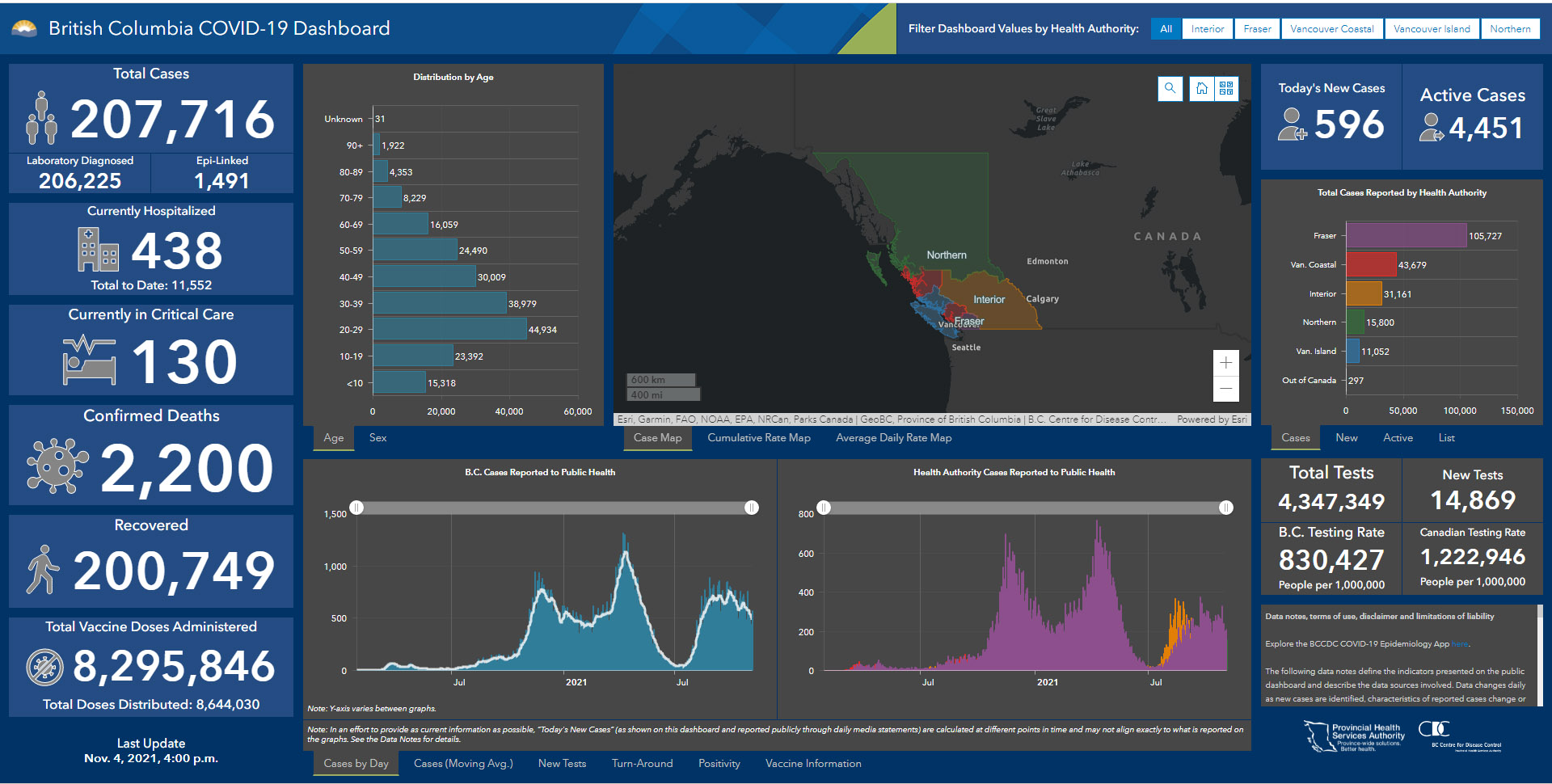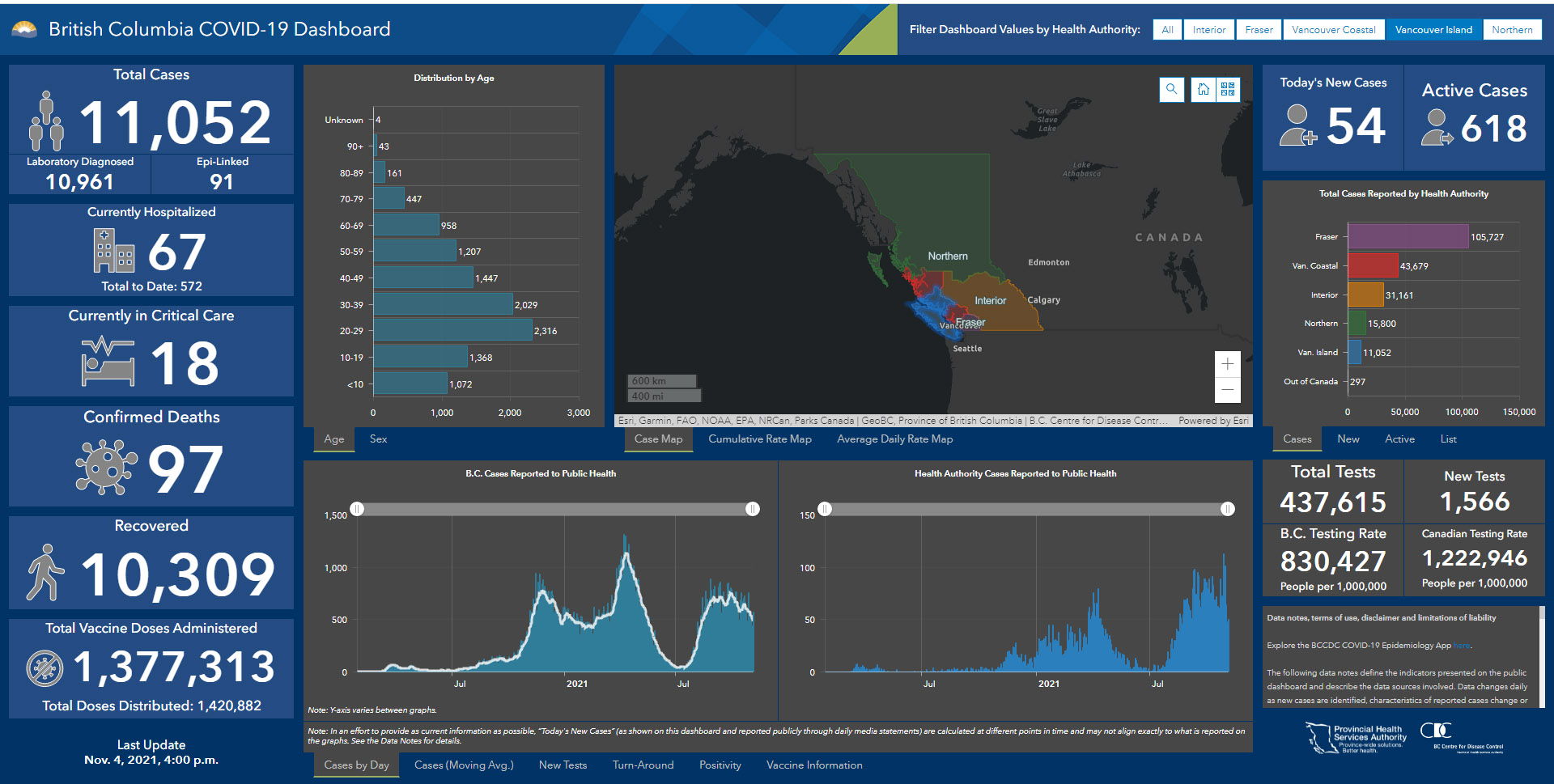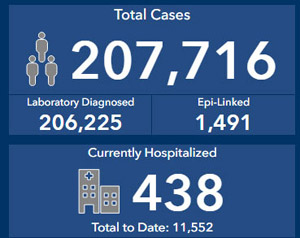
Friday November 5, 2021 | VICTORIA, BC
by Mary P Brooke, B.Sc., Editor | Island Social Trends
The COVID epidemiological dashboard for BC was not updated for three days at the start of this month. On November 1, 2 and 3 (Monday through Wednesday of this week) the dashboard was ‘stuck’ at October 29.
Preparation of the latest COVID modelling was in the works — with that presentation delivered by Provincial Health Officer Dr Bonnie Henry yesterday November 4, and several data corrections were likely in process as well (based on statements made by Dr Henry about catching up from some health authorities, mostly Northern and Interior).
That left correct totals in the lurch for almost a week (from last Friday to yesterday, i.e. six days), even though basic news releases with some of the main statistics were issued (as they usually are).
The public is keyed-in:
Obviously accuracy of the data is important, and it’s good that the system caught up. But the interruption caused by lack of full current data in a display that is easy for the public to review is one more indication of how integrated the COVID health emergency realities have become in the daily flow of news coverage (and in the lives of readers).
Between October 29 and November 24 there was an increase of 2,802 total COVID cases in BC (370 in Island Health). In that same six-day period there were 394 more cases in BC among children age 0 to 9 years of age (41 in Island Health), and 393 more cases in youth ages 10 to 19 (34 in Island Health).
Yesterday Dr Henry’s modelling presentation did show a high number of COVID cases in children since the return to school in September.
The number of hospitalizations increased by 214 in the six-day period (Oct 29 to Nov 4), with 40 of those in Island Health.
The number of deaths in BC among test-positive COVID patients has been 2,200 to date (91 in Island Health), which is an increase of 44 since last Friday (six of those in Island Health).
Vaccination levels:
All vaccination statistics do not yet include any children under the age of 12 (as the COVID vaccines have not yet been approved for use in children in Canada).

Of all eligible British Columbians (age 12+), now 85.6% have been fully vaccinated (i.e. received two doses of COVID vaccine), and 90.1% have been partially vaccinated (i.e. one dose).
Also as of November 4, still 3,091 health-care workers have not been vaccinated (two percent of that workforce), as reported by Health Minister Adrian Dix yesterday; the mandated vaccination for health-care workers has a November 22 deadline.
Dr Henry repeated how important vaccination is within the COVID-protection toolkit, as part of her forecast of a challenging few months ahead with the combined impacts of COVID and influenza in the 2021-2022 respiratory season.
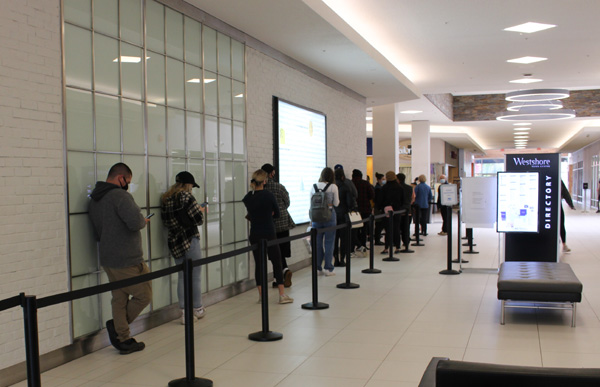
Delta doesn’t help:
The Delta variant is causing even more virulent illness. It transmits easily and causes more severe illness. If people are vaccinated the severity of illness is less, Dr Henry has explained now several times.
Yesterday Minister Dix said that if unvaccinated, the likelihood of ending up in hospital with COVID infection is 50 times greater than if a person is fully vaccinated.
Half the recent deaths in age 80+:
About half of the recent deaths of people due to COVID-19 have been in people over age 80 years, said Dr Henry yesterday during her modelling presentation.
That shows breakthrough infection (as most if not all elderly people have been fully vaccinated in BC), due to a combination of how long ago the full vaccination of elders occurred (i.e. last December or the beginning of 2021, starting in long-term care and broadening out to the independent-living community) and how the shorter interval between two doses at that time (i.e. 28 days, following the manufacturer’s recommendation) was not as effective as a longer interval.
Dr Henry has been advocating a longer interval between COVID doses since early-on in the availability of approved vaccines. At one point (around April to July 2021) the recommended interval was as high as 11 weeks — which favoured people in their 60s and 70s during the age-based rollout. Youth and others returning to campuses this September were hustled through a 28-day interval regimen again in August and September, even though BC Health stated that six to eight weeks (42 to 56 days) was still the recommended interval. All of this points to the need for boosters again by spring 2021.

Health Minister Dix outlined yesterday that 96% of staff in long-term care and acute care are fully vaccinated (two doses) while 98% have their first dose, as an important factor in protecting residents and patients in those facilities.
Indoor mask mandate extended:
The indoor mask-wearing mandate (that was set to expire on October 31, 2021) was extended on October 29, 2021, to continue for as long as the COVID scenario warrants, said the Provincial Health Officer.
Mask-wearing for children in Grades K to 3 was added to the mask mandate for schools, effective October 4; all persons in schools are to wear masks as part of COVID public health protocols.



